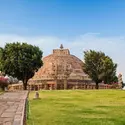- 1. Raisonnement et prédication
- 2. L'art de la controverse
- 3. La doctrine de l'inférence
- 4. Logique, grammaire et perception
- 5. Le mot et la chose
- 6. Le syllogisme en cinq parties
- 7. Théorie de l'argumentation : essais de formalisation
- 8. Logique et connaissance
- 9. Le problème des universaux
- 10. Bibliographie
LOGIQUE INDIENNE
Article modifié le
Bibliographie
S. Bagcchi, Inductive Reasoning. A Study of Tarka and Its Role in Indian Logic, Calcutta, 1953
S. S. Barlingay, A Modern Introduction to Indian Logic, New Delhi, 1965, 2e éd. 1976
V. Bharadwaja, Form and Validity in Indian Logic, South Asia Books, Columbia (Missouri), 1990
D. C. Bhattacharya, History of Navya-Nyāya in Mithilā, Darbhanga, 1958
M. Biardeau, Théorie de la connaissance et philosophie de la parole dans le brahmanisme classique, Paris-La Haye, 1964
J. M. Bocheński, « Die indische Gestalt der Logik », in Formale Logik, pp. 479-517, Fribourg
Munich, 4e éd. 1978
J. Bronkhorst, Tradition and Argument in Classical Indian Linguistics. The Bahiraṅga Paribhāṣā in the Paribhāṣenduśekhara [of Nāgeśa, ca. 1670-1750], Dordrecht, 1986
K. N. Chatterjee, Word and its Meaning. A new Perspective in the Light of Jagadīśa's (around 1600) Śabda-śakti-prakāśikā, Varanasi-Delhi, 1980
R. S. Y. Chi, Buddhist Formal Logic I (A Study of Dignāga's Hetuc̱akra and K'uei-chi's Great Commentary on the Nyāya-praveśa), Londres, 1969
L. Cousins, A. Kunst & K. R. Norman dir., Buddhist Studies in Honour of I.B. Horner, Dordrecht, 1974
E. Frauwallner, « Vasubandhu's Vādavidhih », in Wiener Z. Kunde Süd-u. Ostasiens u. Arch. ind. Philos., no 1, pp. 104-146, 1957 ; « Die Erkenntnislehre des klassischen Sāṁkhya-Systems », ibid., no 2, pp. 84-139, 1958 ; « Landmarks in the History of Indian Logic, in ibid., no 5, pp. 125-148, 1961
H. K. Ganguli, Philosophy of Logical Construction. An Examination of Logical Atomism and Logical Positivism in the Light of the Philosophy of Bhartṛhari, Dharmakīrti and Prajñakaragupta, Calcutta, 1963
D. C. Guha, Navya Nyāya System of Logic. Some Basic Theories and Techniques, Varanasi, 1968, Delhi, 1979
P. Hacker, « Ānvīkṣikī », in Wiener Z. Kunde Süd-u. Ostasiens u. Arch. f. ind. Philos., no 2, pp. 54-83, 1958
R. P. Hayes, « Diṅnāga's Views on Reasoning (Svārthānumāna », in J. of Indian Philosophy, no 8, pp. 219-277, 1980
B. K. Matilal, « Double Negation in Buddhist Logic », in J. of Indian Philos., no 3, pp. 3-16, 1975
R. Herzberger, Bhartṛhari and the Buddhists. An Essay in the Development of Fifth and Sixth Century Indian Thought, Dordrecht, 1986
D. H. H. Ingalls, Materials for the Study of Navya-Nyāya Logic, Cambridge (Mass.), 1951 ; Y. Kajiyama, « Three Kinds of Affirmation and Two Kinds of Negation in Buddhist Philosophy », in Wiener Z. Kunde Süd-u. Ostasiens u. Arch. f. ind. Philos., no 17, pp. 161-176, 1973
A. Kunst, Probleme der buddhistischen Logik in der Darstellung des Tattvasangraha, Cracovie, 1939 ; « An Overlooked Type of Inference », in Bull. of Oriental and African Studies (London), no 10, pp. 976-991, 1940-1942
Y. Mahāprajña, New Dimensions in Jaina Logic, New Delhi, 1984 (trad. anglaise Jaina Nyāya Kā Vikāsa)
B. K. Matilal, The Navya-nyāya Doctrine of Negation, Cambridge (Mass.), 1968 ; « Reference and Existence in Nyāya and Buddhist Logic », in J. Ind. Philos., no 1, pp. 83-110, 1970-1972 ; Epistemology, Logic and Grammar in Indian Philosophical Analysis, La Haye-Paris, 1971 ; The Central Philosophy of Jainism (Anekānta-Vāda), Ahmedabad, 1981
Logic, Language and Reality. An Introduction to Indian Philosophical Studies, Delhi, 1985
B. K. Matilal & R. D. Evans dir., Buddhist Logic and Epistemology. Studies in the Buddhist Analysis of Inference and Language, Dordrecht, 1986
A. C. S. McDermott dir. An Eleventh-Century Buddhist Logic of « Exists ». Ratnakīrti's Kṣaṇabhaṅgasiddiḥ Vyatirekātmikā, Dordrecht, 1970
G. Oberhammer, « Ein Beitrag zu den Vāda-Traditionen Indiens », in Wiener Z. Kunde Süd-u. Ostasiens u. Arch. f. ind. Philos., no 7, pp. 63-103, 1963 ; « Der Svābhāvika-saṃbhanda. Ein geschichtlicher Beitrag zur Nyāya-Logik », in Wiener Z. Kunde Süd-u. Ostasiens u. Archiv. ind. Philos., no 8, pp. 131-181, 1964
Le Compendium des topiques (Tarka Saṃgraha) d'Annaṃbhaṭṭa, avec des extraits de trois commentaires indiens (texte et trad.) et un commentaire par A. Foucher, Paris, 1949
R. Pandeya, Mayor hetvābhasas, a Formal Analysis (With Reference to Nyāya and Buddhism), Delhi, 1984
H. .N. Randle, Indian Logic in the Early Schools. A Study of the Nyāyadarśana in Its Relation to the Early Logic of Other Schools, Londres, 1930
D. S. Ruegg, Contributions à l'histoire de la philosophie linguistique indienne, Paris, 1959
P. S. Sanghavi, « Fundamental Problems of Indian Philosophy (A Comparative Study with Special Reference to the Jaina System) », in Indian Stud. Past & Present, no 2, pp. 189-201, pp. 387-494, 1960-1961 ; Advanced Studies in Indian Logic and Metaphysics, Calcutta, 1961
H. Scharfe, Die Logik im Mahābhāṣya, Berlin 1961
S. Schayer, « Studien zur indischen Logik », in Bull. int. pol. sci. et lettr., Cl. hist. et philol., pp. 98-102, 1932, pp. 90-96, 1933 ; N. Schuster, « Inference in the Vaiśeṣika-sūtras », in J. Ind. Philos., no 1, pp. 341-395, 1970
1972
D. Sharma, The Differentiation Theory of Meaning in Indian Logic, La Haye, 1969 ; The Negative Dialectics of India. Study of the Negative Dialecticism in Indian Philosophy, East Lansing, 1970
D. N. Shastri, Critique of Indian Realism. A Study of the Conflict between the Nyāya-Vaiśeṣika and the Buddhist Dignāga School, Agra, 1964
E. A. Solomon, Indian Dialectics. Methods of Philosophical Discussion I-II, Ahmedabad, 1976-1978
J. F. Staal, « Correlations between Language and Logic in Indian Thought », in Bull. School Orient. African Stud., no 23, pp. 109-122, 1960 ; « Negation and the Law of Contradiction in Indian Thought. A Comparative Study », in Bull. School Orient. African Stud., no 25, pp. 52-71, 1962 ; « Sanskrit Philosophy of Language » in T. A. Sebeok dir., Current Trends in Linguistics V, pp. 499-531, La Haye-Paris, 1969 ; Universals, Studies in Indian Logic and Linguistics, Univ. of Chicago Press, 1988
T. Stcherbatsky, Teorija poznanija i logika po učeniju pozdn ''jših budsitov', t. I-II, St.-Petersbourg, 1903/1909 (en allemand : Erkenntnistheorie und Logik nach der Lehre der späteren Buddhisten, Munich, 1924) ; Buddhist Logic, t. I-II, Leningrad, 1930
1932 (réimpr. Osnabrück, 1970)
E. Steinkellner, « Wirklichkeit und Begriff bei Dhamarkīrti », in Wiener Z. Kunde Südasiens u. Archiv. f. ind. Philos., no 15, pp. 179-211, 1971
M. Tachikawa, « A Sixth-Century Manual of Indian Logic [= Nyāya-praveśa of Śaṃkarasvāmin] », in J. Indian Philos., no 1, pp. 111-129, 1970-1972
G. Tucci, « Buddhist Logic before Diṅnāga », in J. Royal Asiast. Soc., pp. 451-488, pp. 870-871, 1929 ; Pre-Diṅnāga Buddhist Texts on Logic from Chinese Sources, Baroda, 1929
S. Vidhyābhūsana, A History of Indian Logic, Ancient, Mediaeval, and Modern Schools, Calcutta, 1921, Delhi, 1971, rééd. South Asia Books, 1988.
Accédez à l'intégralité de nos articles
- Des contenus variés, complets et fiables
- Accessible sur tous les écrans
- Pas de publicité
Déjà abonné ? Se connecter
Écrit par
- Kuno LORENZ : docteur en philosophie, professeur de philosophie
Classification
Autres références
-
BOUDDHISME (Histoire) - Littératures et écoles bouddhiques
- Écrit par André BAREAU
- 5 973 mots
C'est chez les Vijñānavādin qu'apparut, dès le début du vie siècle, une très importante école de logiciens dont le fondateur fut Diṅnāga. Celui-ci est notamment l'auteur du Nyāyamukha, ou « Bouche de la logique », du Pramāṇasamuccaya, ou « Accumulation des critères... -
BOUDDHISME (Les grandes traditions) - Bouddhisme indien
- Écrit par Jean FILLIOZAT et Pierre-Sylvain FILLIOZAT
- 10 646 mots
- 1 média
À la dialectique élaborée chez les Mādhyamika s'est adjointe une active spéculation de logique positive, parallèle à celle des milieux brahmaniques. Avec Dignāga, cette logique bouddhique s'est constituée en science autonome. Dignāga étudie spécialement la connaissance et discute ses modes. Vijñānavādin,... -
CANDRAKĪRTI (fin VIe s.)
- Écrit par Jean-Christian COPPIETERS
- 562 mots
Un des plus grands maîtres de l'école mādhyamaka. Candrakīrti serait né au Samanta, dans le sud de l'Inde. Élève de Kamalabuddhi, il découvre par lui les œuvres de Nāgārjuna, de Buddhapālita et de Bhāvaviveka. Établi à Nālandā, il se trouva en concurrence avec Candragomin, de l'école yogācāra....
-
DINNĀGA ou DIGNĀGA (VIe s.)
- Écrit par Jean VARENNE
- 152 mots
L'un des maîtres les plus importants de la logique bouddhique vivant au vie siècle. Dinnāga (on écrit aussi Dignāga) appartenait à l'école illustrée par Vasubhandu (de peu son aîné), qui tenait que les prétendues réalités du monde phénoménal ne sont, en fait, que des représentations (...
- Afficher les 12 références
Voir aussi
- ATTRIBUT & PRÉDICAT, logique
- SYĀD-VĀDA
- MADHYAMAKA ou VOIE MOYENNE
- ASSERTION
- SIGNIFICATION
- SMṚTI, bouddhisme
- SĀDHANA
- BOUDDHISME INDIEN
- INDE, doctrines philosophiques et religieuses
- VIBHAJYAVĀDIN
- LOGIQUE HISTOIRE DE LA
- KATYĀYANA (IIIe s. av. J.-C. env.)
- KAUṬILYA ou KAUTALYA (IVe s.)
- VĀTSYĀYANA (IVe s.)
- SANSKRITE ou SANSCRITE LANGUE
- LOKĀYATA
- ĀJĪVIKA
- MAJJHIMA NIKĀYA, littérature bouddhique
- DHARMAKĪRTI (VIIe s.)
- RAGHUNĀTHA (1475 env.-env. 1550)


